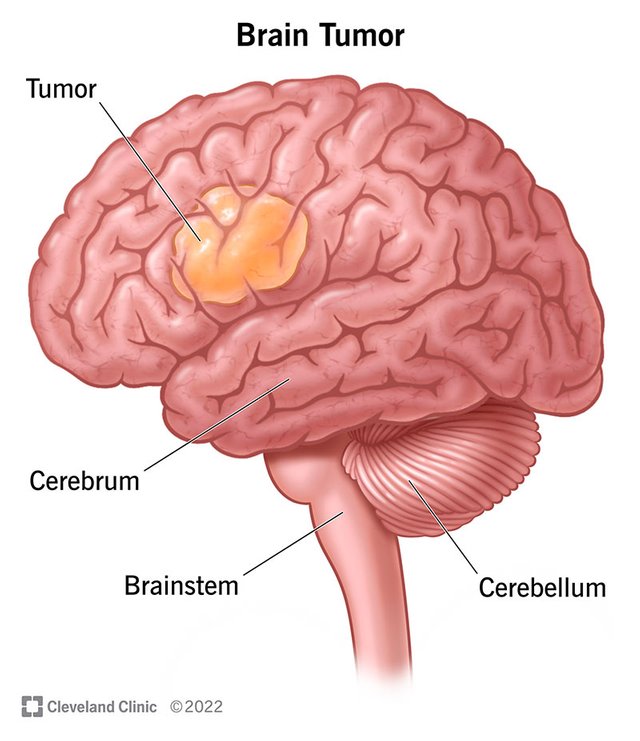INTRODUCTION: Brain Tumours
what is brain tumour. brain tumour is a growth of cells in the brain that multiples in an abnormal, uncontrollable way.
.grades and type of brain tumour
. Brain tumours are graded according to how fast they grow and how likely they to grow back after treatment.
grades 1 and 2 tumours are low grade, while grade 3 and 4 tumours are high grade.
There are the 2 major types of brain rumors.
non-cancerous (benign) brain tumours – these are low grade (grade 1 or 2), which means they grow slowly and are less likely to return after treatment
cancerous (malignant) brain tumours – these are high grade (grade 3 or 4) and either start in the brain (primary tumours) or spread into the brain from elsewhere (secondary tumours); they're more likely to grow back after treat ment.
symptoms of brain tumour
. The symptoms of a brain tumour vary depending on the exact part of the brain affected.
Common symptoms include:
headaches
seizures (fits)
persistently feeling sick (nausea), being sick (vomiting) and drowsiness
mental or behavioural changes, such as memory problems or changes in personality
progressive weakness or paralysis on one side of the body
vision or speech problems
Sometimes you may not have any symptoms to begin with, or they may develop very slowly over time.
who is been affected
. Brain tumours can affect people of any age, including children, although they tend to be more common in older adults.
More than 12,000 people are diagnosed with a primary brain tumour in the UK each year, of which about half are cancerous. Many others are diagnosed with a secondary brain tumour.
.causes and risks.
. The cause of most brain tumours is unknown, but there are several risk factors that may increase your chances of developing a brain tumour.
Risk factors include:
age – the risk of getting a brain tumour increases with age (most brain tumours happen in older adults aged 85 to 89), although some types of brain tumour are more common in children
radiation – exposure to radiation accounts for a very small number of brain tumours; some types of brain tumours are more common in people who have had radiotherapy, or very rarely, CT scans or X-rays of the head
family history and genetic conditions – some genetic conditions are known to increase the risk of getting a brain tumour, including tuberous sclerosis, neurofibromatosis type 1, neurofibromatosis type 2 and Turner syndrome.
treating of brain tumour
. If you have a brain tumour, your treatment will depend on:
the type of tumour
where it is in your brain
how big it is and how far it's spread
how abnormal the cells are
your overall health and fitness
Treatments for brain tumours include:
steroids
medicines to help with symptoms
surgery
radiotherapy
chemotherapy
After being diagnosed with a brain tumour, steroids may be prescribed to help reduce swelling around the tumour.
Other medicines can be used to help with other symptoms of brain tumours, such as anti-epileptic medicines for seizures and painkillers for headaches.
Surgery is often used to remove brain tumours. The aim is to remove as much abnormal tissue as safely as possible.
It's not always possible to remove all of a tumour, so further treatment with radiotherapy or chemotherapy may be needed to treat any abnormal cells left behind.
Treatment for non-cancerous tumours is often successful and a full recovery is possible.
Sometimes there's a small chance the tumour could return, so you may need regular follow-up appointments to monitor this.
.conclusion. Outlook.
. If you have a brain tumour, your outlook will depend on several factors, including:
your age
the type of tumour you have
where it is in your brain
how effective the treatment is
your general health
Survival rates are difficult to predict because brain tumours are uncommon and there are many different types.
Your doctor will be able to give you more information about your outlook.
Generally, around 17 out of every 100 people with a cancerous brain tumour will survive for 5 years or more after being diagnosed.
.Social media handle.
. https://www.facebook.com/profile.php?id=100085937226786&mibextid=ZbWKwL.
.